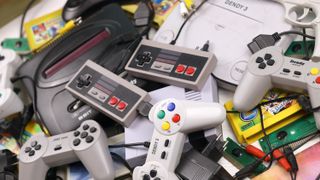Italian authorities bust a $52 million video game trafficking ring — criminals smuggled pirated games and bootleg consoles from China
Not your Granddad's Super Mario Bros.

On Friday, Italy's financial police reported dismantling a sizable video game and console trafficking operation in Italy, based primarily on bootlegged consoles with pirated video games from China [h/t TechXplore]. The scale of this operation places the monetary value at roughly $52.5 million when converted to USD, per the Turin financial police's head of economic crime unit Alessandro Langella, who factors the value of both the ~12,000 seized consoles and the pirated games within that figure.
The pirated games were primarily from popular franchises, and the bootlegged consoles were all based on retro Nintendo, Sega, or Atari hardware. The only named examples of game series favored by the pirates are Super Mario Bros., Street Fighter, and Star Wars. Still, chances are quite high that these bootlegged consoles included near-complete retro console libraries onboard.
The bootleg consoles imported from China were noted as not meeting European technical and safety standards, and nine Italian citizens were arrested in connection to the trafficking ring. They are being charged with trading in counterfeited goods and could see up to eight years in prison, pending case results. It's not looking good for them, to say the least. While piracy crackdowns on consumers can be pretty difficult, cracking down on the pirates or distributors happens much more often and tends to be brutally harsh.
It's not surprising to see such large markets for pirated and bootlegged retro video games and consoles— especially not today, where even basic Raspberry Pis and other smart devices can easily emulate the retro gaming era without any real issue. The reporting seems to suggest that the era of retro gaming being pulled for in this operation was primarily the 80s since Sega and Atari didn't make any consoles in the 90s— this would make most of the pirated games 2D and the bootleg hardware quite cheap to produce. Of course, depending on just how exhaustive the catalog was, there may have been first-gen 3D consoles and their games available, too.
Unfortunately for end users, bootleg console hardware like this tends to come with much higher input lag and may include bootlegged games/ROM hacks instead of pirated mainstream titles. It doesn't matter as much in low-income markets, particularly for users with no legitimate avenue of purchasing an actual console. However, it's still a downside worth noting for educational purposes, if nothing else.
Stay On the Cutting Edge: Get the Tom's Hardware Newsletter
Get Tom's Hardware's best news and in-depth reviews, straight to your inbox.

Christopher Harper has been a successful freelance tech writer specializing in PC hardware and gaming since 2015, and ghostwrote for various B2B clients in High School before that. Outside of work, Christopher is best known to friends and rivals as an active competitive player in various eSports (particularly fighting games and arena shooters) and a purveyor of music ranging from Jimi Hendrix to Killer Mike to the Sonic Adventure 2 soundtrack.
-
ReyalsKanras A quick search suggests Sega sold 9.26 million consoles from 1994 to 2000. Not sure how many they made, but it was probably more than zero. Of course no one else remembers the Saturn so why would the hardware enthusiasts?Reply
Most Popular



